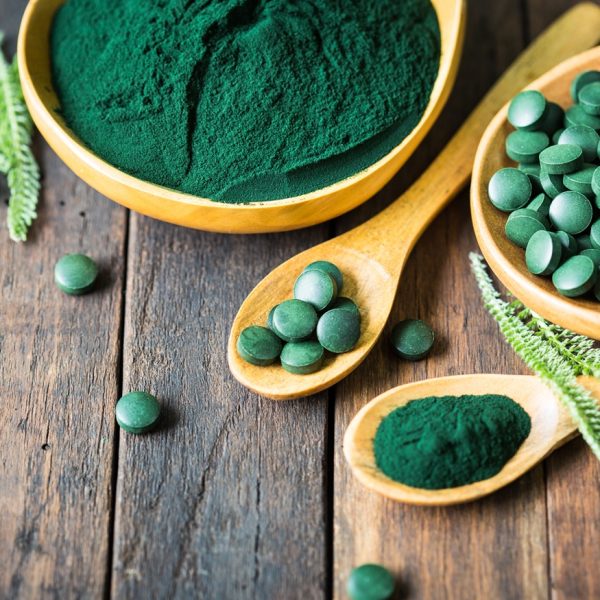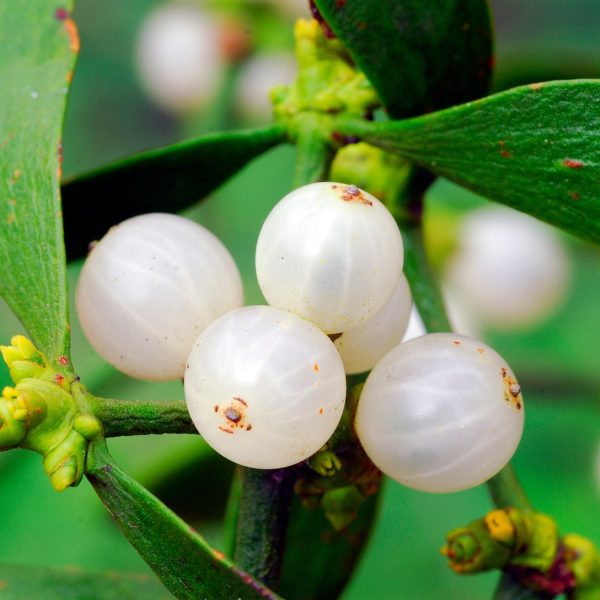Ulcerative colitis is an inflammatory bowel disease that manifests as flare-ups of symptoms. Herbal treatment aims to reduce inflammation and moderate the immune response.
Understanding ulcerative colitis

Ulcerative colitis is one of two inflammatory bowel diseases (IBD), which affects the large intestine (colon and rectum) and is thought to be the most common of the two worldwide (1). It can range from being mild with infrequent episodes of symptoms, to serious which can result in interruption in daily activities for those experiencing it, and in some cases hospitalisation.
In the UK it is estimated that 1 in every 227 people has been diagnosed with ulcerative colitis (2), and statistics suggest that there are 7–150 cases per 100,000 people in western Europe and the United States (3). The condition can happen at any age, but diagnosis is most common in people between 15–25 years of age. It is more common in people of white European ethnicity, with Jewish people having a three to sixfold higher incidence, whereas it is rare in people of Asian ethnicity (2,3).
How does ulcerative colitis work?
Ulcerative colitis is an inflammatory condition which affects the mucosa and submucosa of the large intestine. It seems to involve a combination of the following (1):
- Defective epithelial barriers: Whereby there may be an issue with mucin. Mucin is a part of mucous which coats epithelium / mucous membranes and helps to protect them from stress damage.
- Issues with tight junctions: Tight junctions are cells that form a protective barrier to prevent fluids leaking into spaces they are not usually supposed to be.

There also seems to be an imbalance in immune cells which evokes an immune response against the epithelium.
There is usually a sharp border between the affected and non-affected areas of ulcerative colitis, and it is rare that the condition will affect the whole of the large intestine at one time. Very rarely, in serious cases of the condition, the musculature can become affected by the ulcerative inflammation (4).
To begin with, ulcerative colitis usually presents with changes in the mucous membrane of the affected area of the colon, which most commonly begins in the rectum and can move proximally (upwards).
The changes that occur in the colon due to ulcerative colitis include erythema; a reddening and dilation of blood vessels caused by an influx of immune cells, with mucosa becoming ‘granulated’ or uneven due to inflammation. The presence of inflammation leaves the mucosa fragile and more vulnerable to damage. These changes in the structure of the mucosa can lead to scattered haemorrhaging which can become ulcerated. In serious cases of the condition there may be large mucosal ulcers with copious amounts of purulent exudate (pus), which is comprised of dead immune and tissue cells which may pass out when going to the toilet (1,4).
Understanding the root

Ulcerative colitis is thought to be an autoimmune condition (2). One theory is that the immune system mistakes harmless bacteria in the colon as a threat and begins to attack the tissues of the colon, which causes inflammation.
It is thought that the microflora of the colon is involved in the condition. Studies have suggested that ulcerative colitis may result, at least in part, from an imbalance in the microflora of the colon and the mucosal immunity of the individual, which results in an aberrant immune response to non-pathogenic bacteria (1).
The background for these immune system changes is thought to be a combination of genetic and environmental factors. A genetic predisposition can leave people more vulnerable to developing the condition, since a family history of ulcerative colitis is seen in between 8–40% of cases (1,3).
Inflammatory bowel disease (IBD), of which ulcerative colitis is one of the most common, is closely linked to Western environment and lifestyle.
Prostaglandin levels seem to be greatly increased in people with IBD, in the colonic mucosa, blood, and stools. Prostaglandins are hormone-like compounds which are made at sites of tissue damage and promote inflammation (usually as part of a healing process). The increased presence of prostaglandins causes a cascade of immune cell production which amplifies inflammation (3).
There is a theory that ulcerative colitis can be initially triggered by a viral infection (such as rotavirus, Epstein-Barr), or bacterial infection of the gastrointestinal tract, or candida. It is postulated that these infections may initiate and then perpetuate IBD (3).
Signs and symptoms

Ulcerative colitis is a condition that tends to have flare-ups (active phases of the condition) and remissions (phases where the condition is less active). As such, some people may go long periods with very mild symptoms, or none at all, and then periods with troublesome symptoms.
Symptoms can include (1,2):
- Frequent bowel movements
- Bloody diarrhoea (with or without mucous)
- Urgency to pass a stool
- Tenesmus (incomplete bowel movements)
- Abdominal pain
Other (extra-intestinal) symptoms can include:
- Malaise (feeling generally unwell)
- Fever
- Painful and swollen joints (arthritis)
- Mouth ulcers
- Swollen fat under the skin causing bumps and patches — this is known as erythema nodosum
- Irritated and red eyes
Stress is also thought to be a potential factor which can influence a flare-up of symptoms (2).
Herbal solutions
Ulcerative colitis can be a serious health condition, which may require medical attention. If you have ulcerative colitis and are under medical care, it is important to keep your doctor informed if you decide to seek herbal treatment to support you with it, especially if you are taking prescribed medications to manage the condition.
If you are thinking about seeking herbal medicine support for ulcerative colitis, it would be best to seek the guidance of a trained herbalist, who would be able to provide treatment specific to you, and to work with you and any other care providers to ensure you receive appropriate support for your needs. See our resources page for details on where to find a herbalist.

Chamomile
Chamomile is a well-known remedy for complaints of the digestive system, and this is no exception in cases of ulcerative colitis, where it is specifically indicated.
The distinct aroma of chamomile is due to the presence of essential oils, which are known to have anti-inflammatory properties. Additionally, the presence of flavonoids, namely apigenin, has a strong anti-inflammatory effect, and it is these anti-inflammatory properties which are beneficial in ulcerative colitis, since they work specifically on the mucous membranes of the digestive tract, encouraging healing and healthy function. Chamomile is also known to have antiulcer properties which may be due to its reparative effects on mucous membranes.
In a cross-sectional study of herbal medicine use amongst patients with IBD, chamomile was found to be the most frequently used herb. A total of 43 patients from the Kerman region in Iran participated in the cross-sectional study which was conducted over a six-month period. The study indicated that herbal medicine use was directly linked to quality of life in IBD patients, and significantly lower symptom severity scores (5). Although this does not link only to chamomile to these improvements and is not a controlled clinical trial so there may be other factors involved in these conclusions, it does suggest scope for further research into chamomile and its effects on patients with ulcerative colitis.
Another benefit of chamomile is that it eases anxiety and stress, which can be helpful when stress is perhaps exacerbating flare-ups of ulcerative colitis, or indeed as a by-product of managing the condition.
Chamomile is a particularly accessible herbal remedy as it can be drunk as a simple herbal infusion which it is generally safe to do so in most cases.
Echinacea
Echinacea is a fantastic herb for immune support. It acts to modulate the immune system, helping to bring it back into balance, rather than suppressing or stimulating it. When there is a loss of equilibrium with immune responses, such as with conditions like IBD which may be of autoimmune origin, echinacea can be supportive in re-establishing balance and a healthier functioning of the immune system.
In cases of ulcerative colitis this can be beneficial both when the onset of the condition may have been linked to an infection (either bacterial or viral), and as an anti-inflammatory to reduce inflammation, promote healing and repair of inflamed or ulcerated areas in the colon, and potentially prevent their progression.
An in vitro trial on an inflammatory model of human colon cells, was carried out to assess the anti-inflammatory effects of phenolic compounds from echinacea purpurea extracts of flowers, leaves, and roots, after digestion. The results demonstrated that despite reduced bioavailability of the phenolic compounds after digestion, the anti-inflammatory effects were preserved in the leaf and flower extracts. All extracts exerted significant reductions in immune and inflammatory marker levels (IL-6, IL-8 and PGE2) (6). Although this study was carried out on cells and so is not directly applicable to humans, it does indicate the potential benefits of these ethanol extracts of Echinacea purpurea for reducing inflammation in ulcerative colitis and suggests further research may be needed.

Licorice
Licorice is a herb with anti-inflammatory properties, which can help to soothe mucous membranes in the digestive tract. It also has a harmonising effect on inflammatory processes in the body and can re-establish balance in stress responses via the HPA-axis, by lowering circulating cortisol levels, and therefore reducing the impact that extensive high levels of cortisol can have on the immune system and inflammation.
This makes licorice a helpful herb in most cases of ulcerative colitis, and especially when stress levels are high or seem to exacerbate the condition.
Interestingly, licorice features in many traditional Chinese medicine (TCM) formulations which are used in the treatment of ulcerative colitis (7).
Boswellia
Boswellia offers scope for benefit in cases of ulcerative colitis based on its anti-inflammatory properties. It is indicated specifically in ulcerative colitis (8) and is thought to re-establish balance in the gut microbiome, which may explain one way it can be helpful in ulcerative colitis, since disturbed microbiome may be a triggering factor in the onset of the condition.
Modifying bowel flora is helpful as part of a herbal approach to supporting people with ulcerative colitis, to reestablish a balance of healthy bacteria in the bowel, and reduce to chances of inappropriate immune responses here. Herbs which can help to modify bowel flora include aniseed, garlic, green tea, oregano, and marshmallow root.
Medicinal fungi such as reishi and shitake mushrooms both have an immune modulating and tonifying effect, so can be beneficial in conditions which may be of auto-immune origin such as ulcerative colitis (8).
Holistic solutions

Diet
It is thought that there are certain foods which can trigger an immune response in some people, leading to inflammation in the digestive tract, which can aggravate ulcerative colitis. An elimination diet can be helpful for establishing which foods may trigger flare-ups of ulcerative colitis.
Some trigger foods which are often found to be irritants to the condition include wheat, dairy, spicy foods, and refined sugar (3). Excluding these foods one-by-one for a period may be helpful to establish whether this is the case for you. A herbalist would be able to provide guidance on an elimination diet and tracking symptoms to see whether they are linked to certain foods.
Reduction of dietary red meat and dairy which can be pro-inflammatory, whilst increasing omega 3 fatty acids, containing EPA and DHA reduces the formation of inflammatory compounds may help to reduce inflammation (3).
To manage bowel dysbiosis dietary recommendations include high complex carbohydrates and high fibre (3).
Supplements
Nutritional deficiencies can occur as a result of ulcerative colitis, and so supplementation for this can be helpful support, including:
- Zinc
- Magnesium
- Folate
Supplements to reduce inflammation:
- Fish oils
- Vitamin E
- Quercetin
Support tissue healing:
- Vitamin A
- Zinc
Mental and emotional stress seems to exacerbate IBD, and so stress management is useful as part of the management for ulcerative colitis. This may include:
- Breathing exercises
- Yoga
- Meditation
References
- Lynch WD, Hsu R. Ulcerative Colitis. In: StatPearls [Internet]. Treasure Island (FL): StatPearls Publishing; 2024. Available from: https://www.ncbi.nlm.nih.gov/books/NBK459282/. Accessed July 5, 2024.
- Ulcerative Colitis. NHS. https://www.nhs.uk/conditions/ulcerative-colitis/. Accessed July 3, 2024.
- Pizzorno J, Murray M, Joiner-Bey H, The Clinician’s Handbook of Natural Medicine. 2nd ed. St Loius, Missouri: Churchill Livingstone Elsevier; 2008.
- Ulcerative Colitis. MSD Manual Professional Version. https://www.msdmanuals.com/professional/gastrointestinal-disorders/inflammatory-bowel-disease-ibd/ulcerative-colitis. Accessed July 3, 2024.
- Shamsaddini E, Hasheminasab FS, Raeisezadeh M, Haji-Maghsoudi S, Azizian A, Azimi M. The use of herbal medicine in patients with Inflammatory Bowel Disorders in Iran: a cross-sectional study. European Journal of Integrative Medicine. 2024:102384;ISSN 1876-3820, https://doi.org/10.1016/j.eujim.2024.102384.
- Ávila-Gálvez MÁ, Giménez-Bastida JA, Karadeniz B, Romero-Reyes S, Espín JC, Pelvan E, González-Sarrías A. Polyphenolic Characterization and Anti-Inflammatory Effect of In Vitro Digested Extracts of Echinacea purpurea L. Plant Parts in an Inflammatory Model of Human Colon Cells. Int J Mol Sci. 2024 Feb 1;25(3):1744. doi: 10.3390/ijms25031744. PMID: 38339018; PMCID: PMC10855148.
- Zong Y, Meng J, Mao T, et al. Repairing the intestinal mucosal barrier of traditional Chinese medicine for ulcerative colitis: a review. Frontiers in Pharmacology. 2023 ;14:1273407. DOI: 10.3389/fphar.2023.1273407. PMID: 37942490; PMCID: PMC10628444.
- Bone, K, The Ultimate Herbal Compendium. Warwick, Queensland: Phytotherapy Press; 2007.































